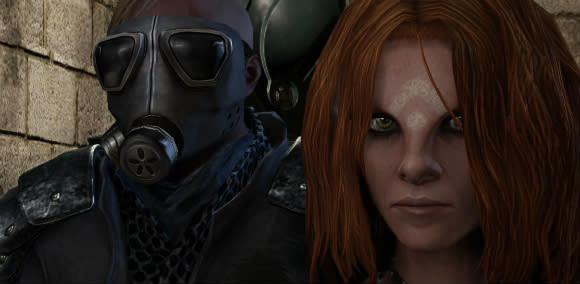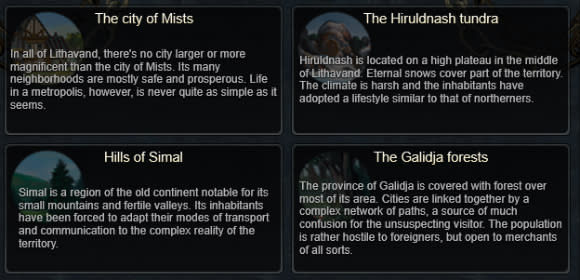Free for All: Why developers need to stop apologizing
Remember the old saying "confidence is attractive"? Well, it is. It's possible that we've all been the victim of a confident person at one time or another, whether we're buying that extra add-on for our cable package or "investing" money into a Kickstarter. This is exactly why an MMO developer needs to be confident and keep the apologizing to a minimum.
Apologies come in many different forms. Over the course of our lives, we spend a lot of time giving and receiving apologies. It's not as sinister as it sounds; saying "sorry" helps cut down on confrontation and can even help to form new relationships. Unfortunately it's also very easy to apologize too much. In this age of indie development and crowd-funding, developers need to be aware of when they are saying sorry too much, and players need to watch out for overly apologetic people.

Let me be clear: When I talk about apologizing too much, I am not talking about owning up to a genuine mistake. When a developer does something obviously wrong, he or she needs to make sure to apologize in a truthful yet speedy manner. This article is not debating the need for an apology that comes after a mistake is made. Instead, I am referencing an apology that comes before anything else.
There are many ways, subtle and obvious, to apologize.
One type of unnecessary apology comes in the form of discussing original premises in a yet-to-be-released title. In an example, developer X issues a FAQ about an upcoming game. In it, the developer compares this new game to another title. "Our game will not be like game Z," says the FAQ. While comparisons to existing titles are an inevitability, they are not something that need be made by the developer. If a reader wants to write up concerns about the soon-to-be-released game in the comments section, the developer could briefly respond to the concerns, but taking the initiative to discuss just how a new game is not like game X can make developer X seem underconfident in his new game's basic premise.

When a developer discusses how the new title is like something else, that developer is recognizing the player who might just want a cloned, newer version of the current favorite. Instead of listing the new game's systems or ideas behind the new game's designs, some developers will talk about how the game might or might not attract a certain type of player. Even if the developer is borrowing mechanics or systems from other titles, every title has done the same thing in some capacity. A developer's job is to put a unique spin on it by containing those systems in a unique world, lore, or look. A current gamer will know how the new game compares to others, and a person who has not yet played many games won't notice anyway. Comparisons are not needed.
Developers can avoid apologizing by remaining confident in their product. I often hear an apologetic tone coming from inexperienced indie developers, but I've also heard it from AAA creators. These apologies come in the form of jokes about the game's players ("Our players are a bit nuts!"), acknowledgments about the game's shortcomings ("It's not for everybody!"), or halfhearted sales pitches.
Making jokes about a game's systems or players might seem like something to do when a developer wants to sound like a gamer and not an executive, but the truth is that jokes often come off as self-deprecating. Admitting that a new game may or may not be for everybody is too obvious to be useful -- of course the game won't be for everyone. Admitting that a game will be attractive to player type A or B might feel like honesty, but I can promise one result: It will limit the number of players who consider and then play the game, whether they fit the types or not. A developer should just list the game's systems or selling points and let the player decide whether it's right for her.
A halfhearted sales pitch is possibly the most damaging. I am not asking developers to use more PR-speak while employing a radio voice! I am asking developers to know their game, to enjoy it, and to appear eager to answer questions about it. I've talked to nervous new employees who had never done an interview before, resulting in less-than-stellar interviews, but many of them were so excited by the game they were making and selling they were still able to have a good time. I don't care if a developer cannot name every NPC in his game as long as he is having fun.

I'm going to use DC Universe Online's Jens Andersen as an example. When I get to do an interview with him, I am normally excited and a little nervous because of my permanent noob status. The interview will normally happen over Skype, and we will usually play together in the game while livestreaming or recording the audio. Jens seems to know DC Universe Online like the back of his hand. Not only that, but he seems to know the DC comic universe as well. During the interview, he'll explain the things he needs to make them clear for a DCUO player of my level, and he is able to take up the slack and adjust to the situation. I have witnessed him toss out super-specific information about the game, then turn around to explain the basics to noobs like me and some of our readers. And, even though his expertise can sometimes feel intimidating, he has fun while he does his job! He can recite every selling point of the game but can tell you why he enjoys playing it.
Critically, I rarely hear an apologetic tone coming from Jens. Even if something in the game seems off or there appears to be a glitch or bug, he rolls with it. A good developer appears to know that these issues are par for the course and are unworthy of focus when he could instead be talking about the rest of the game.
What I am asking for might sound like an abstract, Jedi-like ability to maintain perfect balance while making a game, but that's not it. I am simply asking developers to stop covering up their designs with thick explanations. Gamers know when a system is borrowed from another game, and they generally don't mind as long as the entire package is something unique. Developers should own what they have made, learn it back-and-forth, and balance external criticism with feedback from players who log in to the game every day without much complaint.
Apologizing is so easy that many of us will do it without thinking. A game developer needs to be aware of when she is doing it so she can stop. I don't want to read about how a game is made for player A or B or how the game is not trying to be like game X or Z. I want to get excited by what the game is.

Every Saturday, Free for All brings you ideas, news, and reviews from the world of free-to-play, indie, mobile, classic, and import games -- a world that is often overlooked by gamers. Leave it to Beau Hindman to talk about the games you didn't know you wanted! Have an idea for a subject or a killer new game that no one has heard of? Send it to beau@massively.com!


